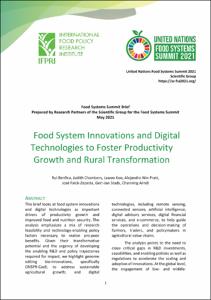Benfica, Rui; Chambers, Judith; Koo, Jawoo; Nin-Pratt, Alejandro; Falck-Zepeda, José; Stads, Gert-Jan; Arndt, Channing: Food System Innovations and Digital Technologies to Foster Productivity Growth and Rural Transformation : Food Systems Summit Brief Prepared by Research Partners of the Scientific Group for the Food Systems Summit May 2021.
Online-Ausgabe in bonndoc: https://doi.org/10.48565/scfss2021-6180
Online-Ausgabe in bonndoc: https://doi.org/10.48565/scfss2021-6180
@article{handle:20.500.11811/9134,
doi: https://doi.org/10.48565/scfss2021-6180 ,
author = {{Rui Benfica} and {Judith Chambers} and {Jawoo Koo} and {Alejandro Nin-Pratt} and {José Falck-Zepeda} and {Gert-Jan Stads} and {Channing Arndt}},
title = {Food System Innovations and Digital Technologies to Foster Productivity Growth and Rural Transformation : Food Systems Summit Brief Prepared by Research Partners of the Scientific Group for the Food Systems Summit May 2021},
publisher = {Center for Development Research (ZEF) in cooperation with the Scientific Group for the UN Food System Summit 2021},
year = 2021,
month = may,
note = {This brief looks at food system innovations and digital technologies as important drivers of productivity growth and improved food and nutrition security. The analysis emphasizes a mix of research feasibility and technology-enabling policy factors necessary to realize pro-poor benefits. Given their transformative potential and the urgency of developing the enabling R&D and policy trajectories required for impact, we highlight genome editing bio-innovations, specifically CRISPR-Cas9, to address sustainable agricultural growth; and digital technologies, including remote sensing, connected sensors, artificial intelligence, digital advisory services, digital financial services, and e-commerce, to help guide the operations and decision-making of farmers, traders, and policymakers in agricultural value chains. The analysis points to the need to close critical gaps in R&D investments, capabilities, and enabling policies as well as regulations to accelerate the scaling and adoption of innovations. At the global level, the engagement of low- and middle-income countries with global players should be facilitated so as to strengthen intellectual property (IP) access and management of innovations; and North-South, South-South, and triangular cooperation should be promoted to strengthen LMICs’ regulatory capabilities. At the national level, countries need to invest in science-based participatory approaches to identify and adapt technologies to local conditions; close regulatory gaps through evidence-based frameworks that enable the rapid development, deployment, and safe use of innovations; close institutional and human capacity gaps by addressing limitations in institutional capacities and coordination, while training a new generation of scientists with the skills needed to develop and deliver innovations; develop an understanding of political economy factors for a nuanced knowledge of actors’ agendas to better inform communications and address technology hesitancy; close digital infrastructure gaps in rural areas by promoting simultaneous investments in digital infrastructure and electrification, reducing data costs, and improving digital literacy; and develop sustainable business models for digital service providers to help them achieve profitability, interoperability, and scale to reach a sustainable critical mass, and thus facilitate the adoption of food systems innovations.},
url = {https://hdl.handle.net/20.500.11811/9134}
}
doi: https://doi.org/
author = {{Rui Benfica} and {Judith Chambers} and {Jawoo Koo} and {Alejandro Nin-Pratt} and {José Falck-Zepeda} and {Gert-Jan Stads} and {Channing Arndt}},
title = {Food System Innovations and Digital Technologies to Foster Productivity Growth and Rural Transformation : Food Systems Summit Brief Prepared by Research Partners of the Scientific Group for the Food Systems Summit May 2021},
publisher = {Center for Development Research (ZEF) in cooperation with the Scientific Group for the UN Food System Summit 2021},
year = 2021,
month = may,
note = {This brief looks at food system innovations and digital technologies as important drivers of productivity growth and improved food and nutrition security. The analysis emphasizes a mix of research feasibility and technology-enabling policy factors necessary to realize pro-poor benefits. Given their transformative potential and the urgency of developing the enabling R&D and policy trajectories required for impact, we highlight genome editing bio-innovations, specifically CRISPR-Cas9, to address sustainable agricultural growth; and digital technologies, including remote sensing, connected sensors, artificial intelligence, digital advisory services, digital financial services, and e-commerce, to help guide the operations and decision-making of farmers, traders, and policymakers in agricultural value chains. The analysis points to the need to close critical gaps in R&D investments, capabilities, and enabling policies as well as regulations to accelerate the scaling and adoption of innovations. At the global level, the engagement of low- and middle-income countries with global players should be facilitated so as to strengthen intellectual property (IP) access and management of innovations; and North-South, South-South, and triangular cooperation should be promoted to strengthen LMICs’ regulatory capabilities. At the national level, countries need to invest in science-based participatory approaches to identify and adapt technologies to local conditions; close regulatory gaps through evidence-based frameworks that enable the rapid development, deployment, and safe use of innovations; close institutional and human capacity gaps by addressing limitations in institutional capacities and coordination, while training a new generation of scientists with the skills needed to develop and deliver innovations; develop an understanding of political economy factors for a nuanced knowledge of actors’ agendas to better inform communications and address technology hesitancy; close digital infrastructure gaps in rural areas by promoting simultaneous investments in digital infrastructure and electrification, reducing data costs, and improving digital literacy; and develop sustainable business models for digital service providers to help them achieve profitability, interoperability, and scale to reach a sustainable critical mass, and thus facilitate the adoption of food systems innovations.},
url = {https://hdl.handle.net/20.500.11811/9134}
}






